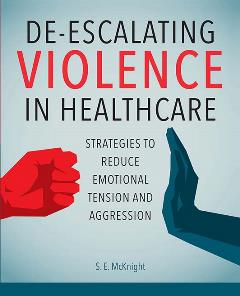Permission to Use Sigma Logo
If you are an Sigma member, go to
The Circle to download the chapter style guide and a JPEG file of the Sigma logo. If you would like a vector image of the logo or crest,
complete this form and your request will be reviewed as soon as possible.
If you are not an Sigma member and would like to request use of Sigma's official logo, contact
marketing@sigmanursing.org. In your email, provide detailed information regarding your intended use. Permission to use the logo or crest is granted on a case-by-case basis, and reasonable notice should be given. Approvals are for one-time use only.
S. E. McKnight provides tools and techniques to help nurses and other healthcare professionals manage aggressive behavior and foster safer working environments

INDIANAPOLIS — Violent incidents are more than four times as likely to occur in healthcare settings than in other professional workplaces. In 2014, 21% of registered nurses and nursing students reported being physically assaulted at work and more than 50% reported being verbally abused. Experts estimate at least 50% of healthcare professionals will encounter violence at least once in their healthcare career.
The most beneficial method of preventing healthcare violence is de-escalation—using therapeutic communication and interventions to defuse emotional tension. In De-Escalating Violence in Healthcare, author S. E. McKnight provides a comprehensive guidebook of therapeutic de-escalation techniques to improve safety in healthcare settings and manage aggressive behavior. The content outlines best practice techniques for easy and successful application in real-world scenarios—providing objectives, case studies, and graphics, as well as electronic assessment and relevant documentation templates. Further, specific techniques that address difficult behavioral issues associated with schizophrenia, dementia, bipolar disorder, delirium, and anxiety/panic disorders are also provided.
“De-escalation is one of the most valuable skills a healthcare worker can possess,” said author S. E. McKnight, DNP, MSN, BA, RN-BC. “Healthcare professionals can, at any time, encounter an agitated person in their profession. How that healthcare worker responds to that situation can make the difference between the situation diffusing and resolving calmly or escalating to a physical, violent encounter.”
The author has also created material downloads to support the use of this book in classroom and professional settings. Materials such as the De-Escalating Violence in Healthcare Quiz (plus answer key) and a De-Escalation Body Language Tips Sheet, along with other supplemental files, are available for free download at https://sigma.nursingrepository.org/handle/10755/17096.
This book is available at SigmaMarketplace.org/SigmaBooks.<
De-Escalating Violence in Healthcare: Strategies to Reduce Emotional Tension and Aggression
By S. E. McKnight, DNP, MSN, BA, RN-BC
Published by Sigma, 2019
ISBN-13: 9781948057493
EPUB ISBN: 9781948057509
PDF ISBN: 9781948057516
MOBI ISBN: 9781948057523
Price: US $59.95
Trade paperback, 296 pages
Trim size: 7 3/8 x 9 1/8
About the author:
S. E. McKnight, DNP, MSN, BA, RN-BC, a mental health educator for more than 22 years, is an adjunct instructor at the University of West Florida. She divides her time among clinical practice, training, consulting, scholarly writing, and research, focusing on de-escalation training to prevent violence and promote holistic wellness and recovery. McKnight developed the first competency-based mental health learning needs assessment for professional nursing practice, which has been published by the American Psychiatric Association as a best practice instrument for research and education.
The Sigma Theta Tau International Honor Society of Nursing (Sigma) is a nonprofit organization whose mission is advancing world health and celebrating nursing excellence in scholarship, leadership, and service. Founded in 1922, Sigma has more than 135,000 active members in over 90 countries and territories. Members include practicing nurses, instructors, researchers, policymakers, entrepreneurs, and others. Sigma’s more than 530 chapters are located at more than 700 institutions of higher education throughout Armenia, Australia, Botswana, Brazil, Canada, Colombia, England, Ghana, Hong Kong, Jamaica, Japan, Jordan, Kenya, Lebanon, Malawi, Mexico, the Netherlands, Pakistan, Philippines, Portugal, Singapore, South Africa, South Korea, Swaziland, Sweden, Taiwan, Tanzania, Thailand, the United States, and Wales.
Learn more at www.SigmaNursing.org.